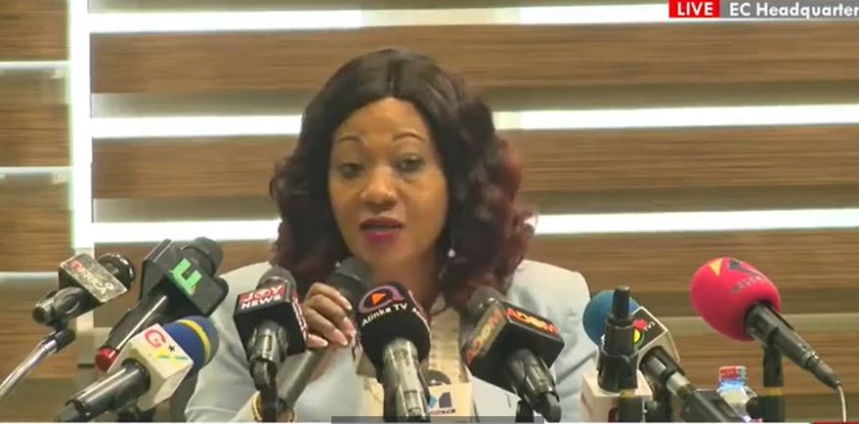The recent District Level Elections (DLEs) have once again brought to the fore the worrying issue of dwindling participation of voters in the local elections and low representation of women in local governance in the country.
The DLEs, which were held on December 19, last year, revealed that 95.9 percent of the 6,243 persons elected as assembly members were males, while females constituted 4.1 percent.
The percentage of elected women assembly members is an increase of 0.3 percent compared to 3.8 percent in the previous election (2019).
However, the statistics showed that female voters did not repose confidence in women contestants, given that the about 6.2 million voters who turned out for the polls were almost evenly distributed between males and females at 50.5 percent and 49.5 percent respectively.
A further dig into the statistics released to the Daily Graphic by the Electoral Commission (EC) showed that the 5,984 males who won the assembly member elections constituted 35.4 percent of the male candidates, given that 16,925 of them contested the polls.
Comparatively, the 259 women who won the elections formed 25 percent of the total female applicants which stood at 1,049.
The figures also showed that 73 persons with disability (PWDs), comprising 55 males and 18 females, won the elections.
In terms of the unit committee elections, 22,646 out of the 42,094 male applicants won, representing 87.2 percent of the total persons elected.
Relatedly, 3,335 out of the 5,666 female applicants for the unit committee elections won, representing 12.8 percent of the total elected members.
For PWDs, 67 candidates, made up of 38 males and 29 females, were elected as unit committee members.
Predictably, the 2023 DLEs recorded yet another low turn-out of 35 percent, two percentage points down from the 37 percent in the previous election (2019).
The EC statistics revealed that many of the peri-urban regions recorded turn-out rates above 50 percent while the urban regions recorded low voter participation.
According to the statistics, the North East Region had the highest voter turnout of 55.2 percent while the Northern, Oti, Upper East, and Upper West regions followed with 52.1 percent, 51.1 percent (Oti and Upper East), and 50.8 percent respectively.
The Savannah, Ahafo, and Western North regions recorded 48.2 percent, 45 percent, and 44.6 percent respectively while the Bono and Eastern regions had 40.1 percent and 38.6 percent each.
Also, the Volta, Central, and Bono regions had 37.2 percent, 36.7 percent, and 36.1 percent turnouts, with the Western Region settling for 33.7 percent.
The Greater Accra and Ashanti regions recorded the lowest turn-outs of 18 percent and 33.4 percent respectively.
Expert views Meanwhile, some experts have described the low participation of women in politics, particularly at the local level, as worrying and anti-developmental.
The Director of the Institute of Local Government Studies, Professor Nicholas Awortwi, recently told the Daily Graphic that although women constituted more than 50 percent of the country’s population, they were underrepresented in terms of leadership at all levels.
Prof. Awortwi added that the lack of incentives for assembly members was largely the cause of the low patronage of the DLEs.
He observed that until the country introduced incentives for assembly members, local government elections would not attract the needed attention and participation of the people, including females.
For instance, he said that compared with the national level, Members of Parliament got incentives such as car loans and salaries, and were given development money otherwise known as the Common Fund to execute projects at the local level but assembly members did not get any form of support.
A Social Development and Gender Specialist/ Consultant, Dr Miriam Rahinatu Iddrisu, also described worrying statistics indicating a decline in women’s participation in politics in the country.
Dr. Iddrisu said the low representation of women in DLEs was largely because of financial barriers, outmoded traditional and religious definition of a leader being a male, as well as the messy nature of politics in the country.
Latest Stories
-
Bawumia calls for calm amid Wontumi’s detention
3 minutes -
Two dead, others injured in Juaso-Nkawkaw Highway crash
10 minutes -
We’re disappointed we didn’t see Wontumi – Dr Bawumia
26 minutes -
GH₵50m bail deliberately set to block Wontumi’s release – Bawumia
27 minutes -
Ashanti Peace Council urges stakeholders to uphold law and protect national peace
39 minutes -
Equipping future healthcare professionals: Cassona Global, Mindray provide free practical training for ATU students
42 minutes -
Bawumia, Minority Leader, granted access to Wontumi as tensions mount over detention
56 minutes -
World Menstrual Hygiene Day: Terry Yegbe Foundation and Groomdatgirl champion menstrual health education at Horti EP Primary
1 hour -
Watch how Bawumia was forced through violent scuffle as NPP supporters clash with Police
1 hour -
NPP currently has no leadership; where is the Chairman? – Nyaho-Nyaho Tamakloe quizzes over Wontumi arrest
1 hour -
Tensions rise as NPP supporters besiege NIB headquarters over Wontumi’s transfer
1 hour -
Eleven Wonders edge RTU to seal Ghana Premier League return
1 hour -
I admire Wontumi, but due process must work – Dormaahene
2 hours -
Wontumi’s detention: Photos from the headquarters of NIB in Accra
2 hours -
Wontumi is not on hunger strike, I had supper with him 2 days ago – Lawyer clarifies
2 hours

